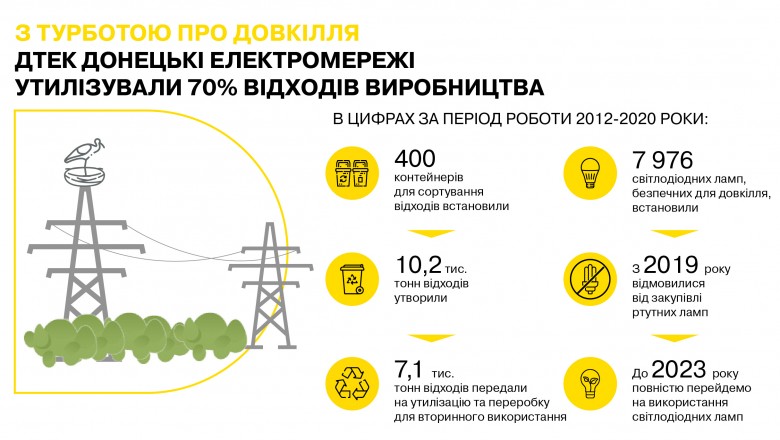Taking care of the environment: DTEK Donetsk Grids handed over 7,100 tons of waste for recycling and reuse

DTEK Donetsk Grids sorts production waste into 40 different categories: glass, wastepaper, polymers, reinforced concrete materials and others. They do this to hand the waste over further for recycling and not accumulate at landfills. 70% of the collected waste is recycled and 30% is disposed in landfills. Such waste management is consistent with the European circular economy and helps to sustainably consume natural resources.
“DTEK is transforming its business in accordance with the New Strategy 2030, based on ESG principles, values and business responsibility for progress in achieving the Sustainable Development Goals of the UN Global Compact. DTEK Donetsk Grids sorts waste and transfers it for recycling to specialized organizations licensed to handle waste. For 8 years of work, 10,200 tons of waste were generated. Of these, 7,100 tons were recycled. The great portion of the waste is reused after recycling,” says Oleksii Degtyarev, CEO of DTEK Donetsk Grids.
The main categories of waste generated by the company are reinforced concrete, wooden poles, scrap of ferrous and non-ferrous metals, waste oil products, tires, oily waste, batteries, waste paper, glass, electrical equipment, polymers, waste mercury-containing lamps, waste rubber products.
Also, DTEK Donetsk Grids annually generate up to 6 tons of broken porcelain insulators. It is an inert material that can be used in the production of refractories, electrical ceramics, as well as for the construction of paths in landscape design. Now, the company is looking for potential consumers.
In addition, DTEK Donetsk Grids implements measures that reduce waste generation. Since 2019, the company has not purchased mercury-containing lamps. If incandescent and energy-saving lamps fail, they are replaced with LED ones. We have already installed 7,976 LED lamps. The plans are to completely abandon the use of mercury-containing lighting fixtures by 2023.
DTEK Donetsk Grids trains all its employees on responsible consumption, waste sorting and recycling not only at work, but also at home, and systematically conducts information campaign to raise a Zero Waste awareness.
As previously reported, in 2020, DTEK Donetsk Grids installed 7 nesting platforms for storks on the power poles in Donetsk Region. Owing to this initiative, more than 70 birds listed in the Berne Convention for the Protection of Natural Habitats in Europe were saved last year alone.

